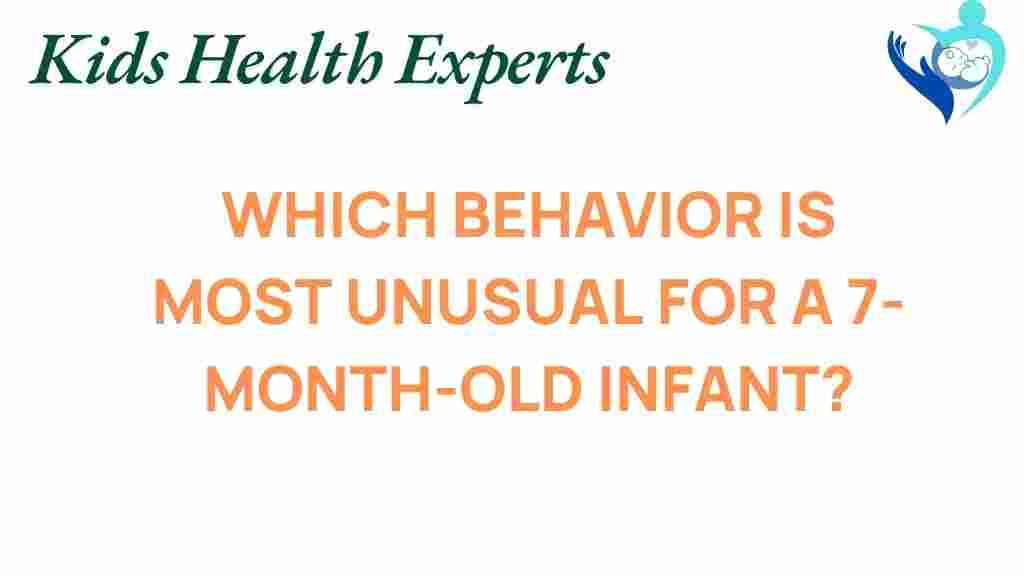Infant Behavior: Unraveling the Oddities of a 7-Month-Old
As parents, observing your little one’s growth and development is both exciting and sometimes perplexing. When your baby reaches the age of 7 months, you may start to notice some behaviors that seem unusual or out of the ordinary. Understanding what’s typical for this age and what might be a cause for concern is essential for your peace of mind and your child’s well-being. In this article, we will delve into the unusual signs of infant behavior, explore child development milestones, and provide parenting tips to help you navigate this stage.
Understanding 7-Month-Old Developmental Milestones
At 7 months, babies undergo significant physical, cognitive, and social development. Here are some key milestones:
- Physical Development: Most babies can sit without support and may start crawling.
- Cognitive Development: They begin to understand cause and effect, engage in more complex play, and show curiosity about their surroundings.
- Social Development: Babies start to express emotions more clearly, such as joy, frustration, and even separation anxiety.
While these milestones are generally expected, every child develops at their own pace. However, some behaviors at this age may seem unusual. Let’s explore what those might be.
Unusual Signs of Infant Behavior in a 7-Month-Old
As you observe your 7-month-old, you may come across certain behaviors that raise eyebrows. Here are some unusual signs to watch for:
1. Lack of Interest in Surroundings
By 7 months, babies are typically curious about their environment. If your child seems uninterested or indifferent to toys, people, or activities, it might be a sign of developmental delays. Early intervention can be crucial in addressing any potential issues.
2. Limited Vocalization
Most babies will babble and coo by this age, experimenting with different sounds. If your baby is not making any attempts to vocalize, or if their sounds are limited, it may warrant further assessment.
3. Unresponsive to Social Cues
Engagement with caregivers is vital for social development. If your 7-month-old does not respond to smiles, voices, or playful interactions, this could indicate a delay in social skills.
4. Unusual Sleeping Patterns
While some variation in sleep is normal, extreme disruptions in sleep patterns—such as frequent waking or excessive sleepiness—can be concerning. It’s essential to monitor your baby’s sleep and discuss any significant changes with your pediatrician.
5. Difficulty with Motor Skills
By 7 months, many babies are beginning to crawl or at least show signs of trying to move. If your baby is not attempting to roll over or sit up independently, this could signal a need for further evaluation.
When to Seek Help: Recognizing Developmental Delays
Noticing unusual signs in your baby’s behavior is an important first step in ensuring they receive the support they need. Here are some key indicators that may suggest developmental delays:
- Not meeting milestones: If your baby isn’t reaching expected milestones or showing signs of regression.
- Consistent lack of interest: If they’re not engaging with their environment or failing to respond to their name.
- Severe mood fluctuations: If they display extreme irritability or prolonged periods of sadness.
Trust your instincts as a parent. If you have concerns about your child’s development, consider reaching out for a professional evaluation. Early intervention can make a significant difference in your child’s development trajectory.
Parenting Tips for Supporting Your 7-Month-Old
Here are some practical parenting tips to foster healthy development in your 7-month-old:
1. Engage in Interactive Play
Playtime is crucial for your baby’s development. Engage in activities that promote sensory exploration, such as:
- Playing with textured toys.
- Reading colorful picture books.
- Singing songs and nursery rhymes.
2. Encourage Movement
Support your baby’s physical development by providing safe spaces for them to explore. Place toys just out of reach to motivate crawling and movement.
3. Establish a Routine
A consistent daily routine can help your baby feel secure. Try to keep regular times for feeding, naps, and play. This predictability can also aid in sleep improvement.
4. Foster Communication
Talk and sing to your baby throughout the day. Respond to their coos and babbles to encourage vocalization. This interaction is vital for language development.
5. Monitor Health and Development
Keep regular appointments with your pediatrician to monitor your baby’s growth and development. Ensure immunizations are up to date and discuss any concerns you may have.
Troubleshooting: Addressing Concerns About Your Baby’s Behavior
As a parent, it’s natural to worry about your baby’s development. Here are some troubleshooting tips if you notice unusual behavior:
1. Keep a Journal
Documenting your child’s behavior can help you identify patterns or changes over time. Note when you see unusual signs and any potential triggers.
2. Talk to Trusted Caregivers
Discuss your concerns with family members, friends, or daycare providers who spend time with your baby. They may have insights or observations that can help.
3. Consult a Professional
If you continue to have concerns, don’t hesitate to consult with your pediatrician or a child development specialist. They can provide guidance and recommend further assessments if necessary.
4. Stay Informed
Educate yourself about child development. Resources such as CDC Milestone Tracker offer valuable information on developmental milestones.
Conclusion: Embracing the Journey of Parenting
Parenting a 7-month-old comes with its share of surprises, and it’s essential to understand what’s typical and what might be cause for concern. By observing infant behavior closely, recognizing unusual signs, and being proactive about early intervention, you can support your child’s development effectively. Remember that every baby is unique, and staying informed will empower you as a parent. Trust your instincts, engage with your little one, and don’t hesitate to seek help when needed. Your child’s health and happiness are worth it!
For more parenting tips and resources, feel free to check out our parenting resource page.
This article is in the category Conditions and created by KidsHealthExperts Team
